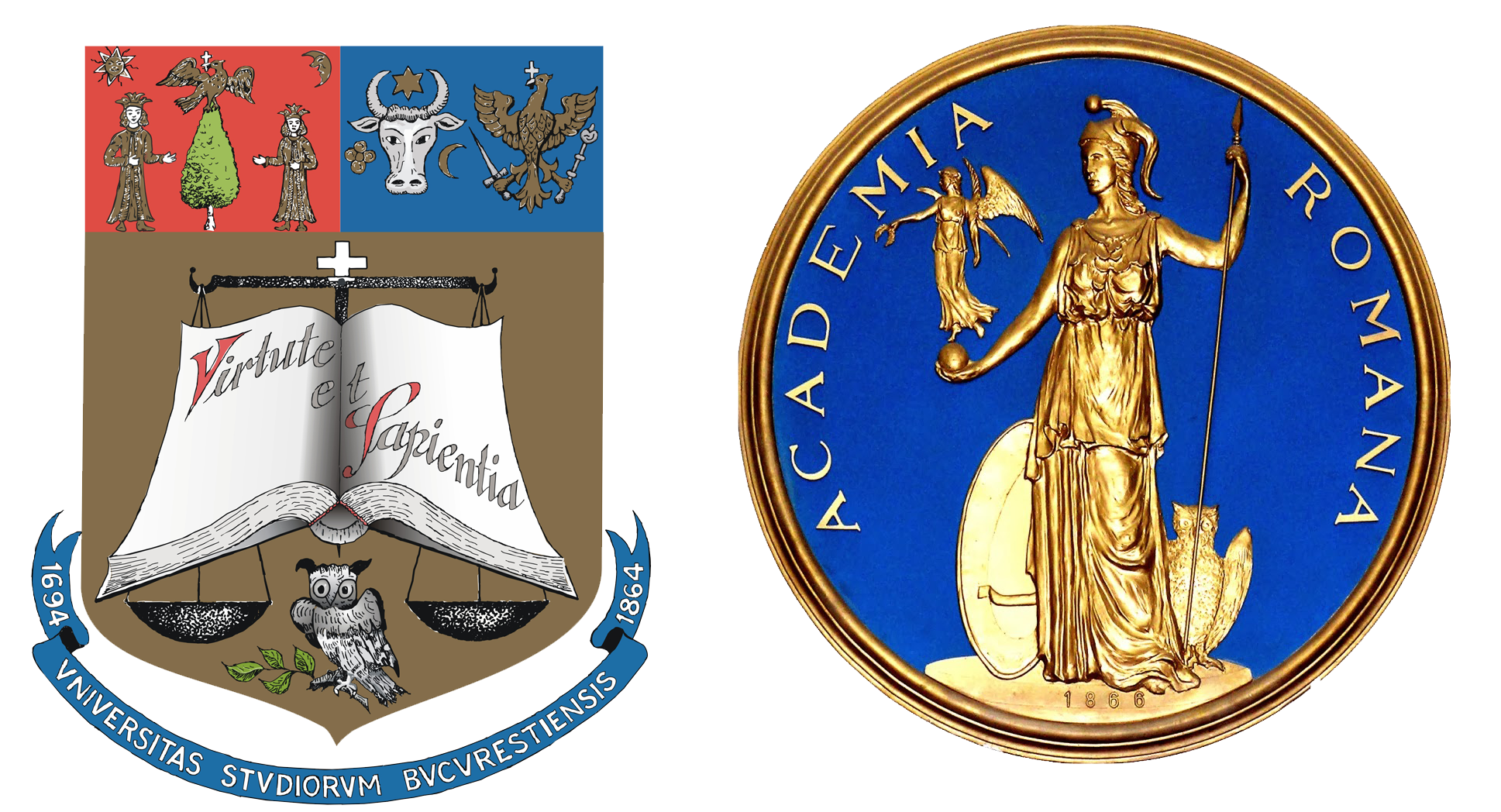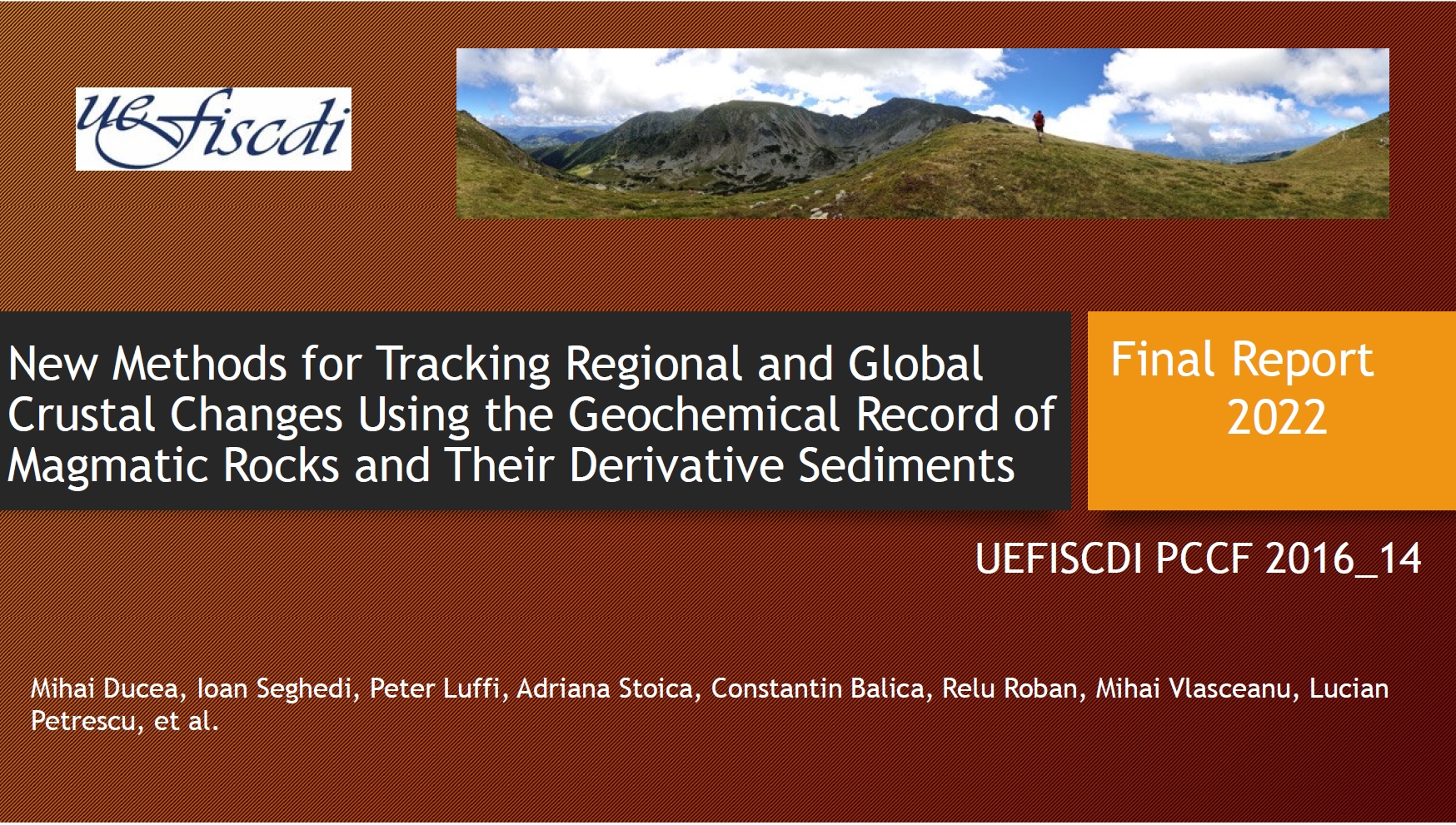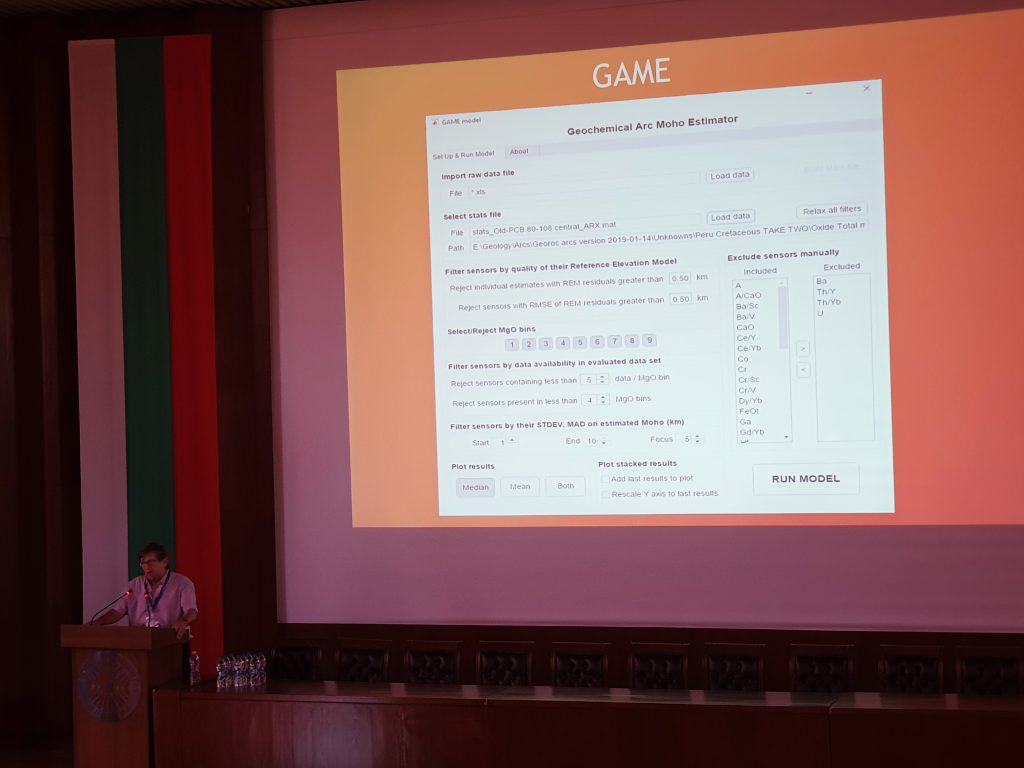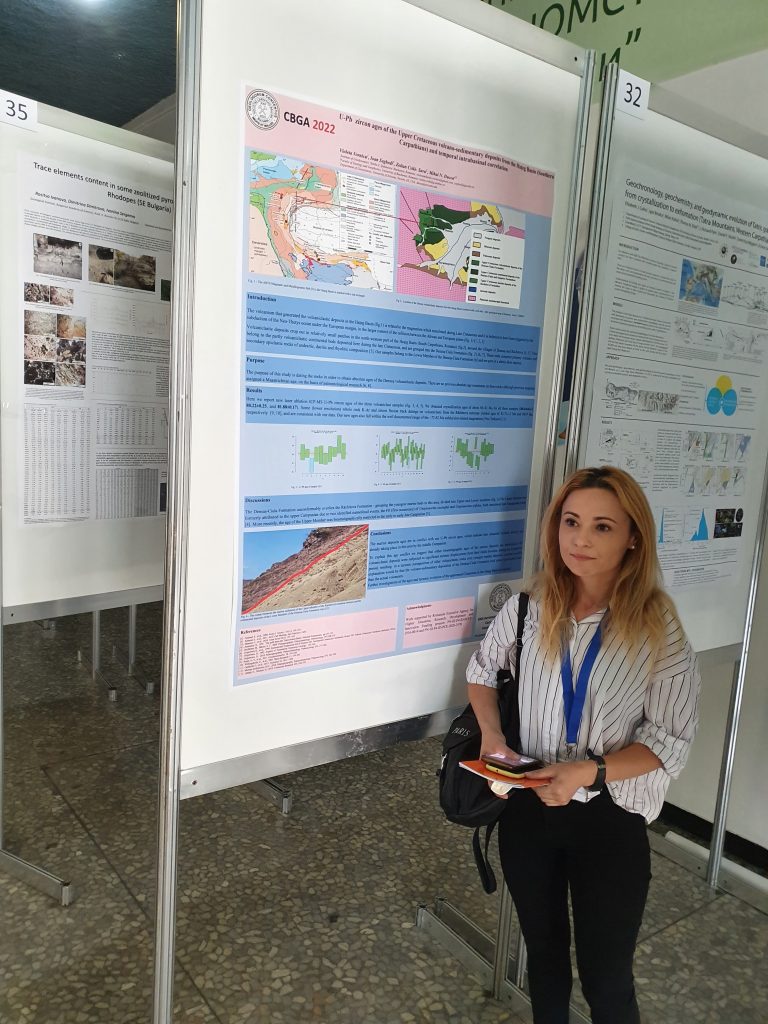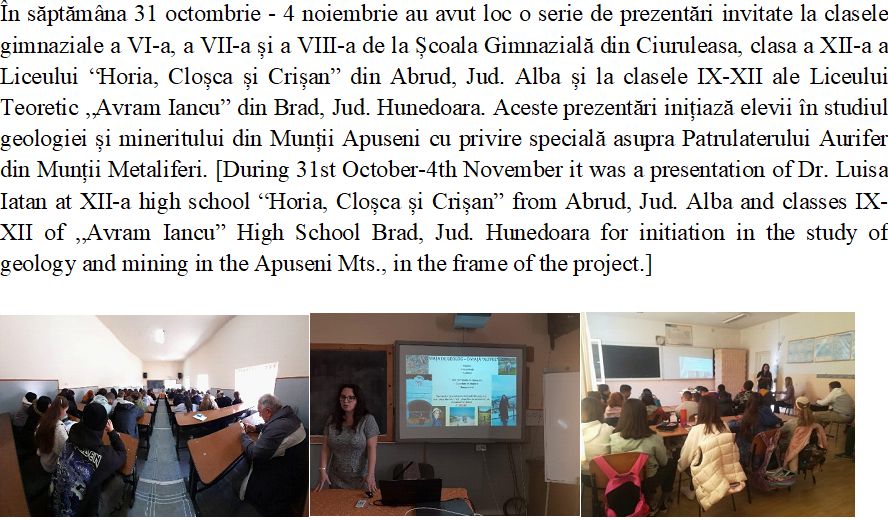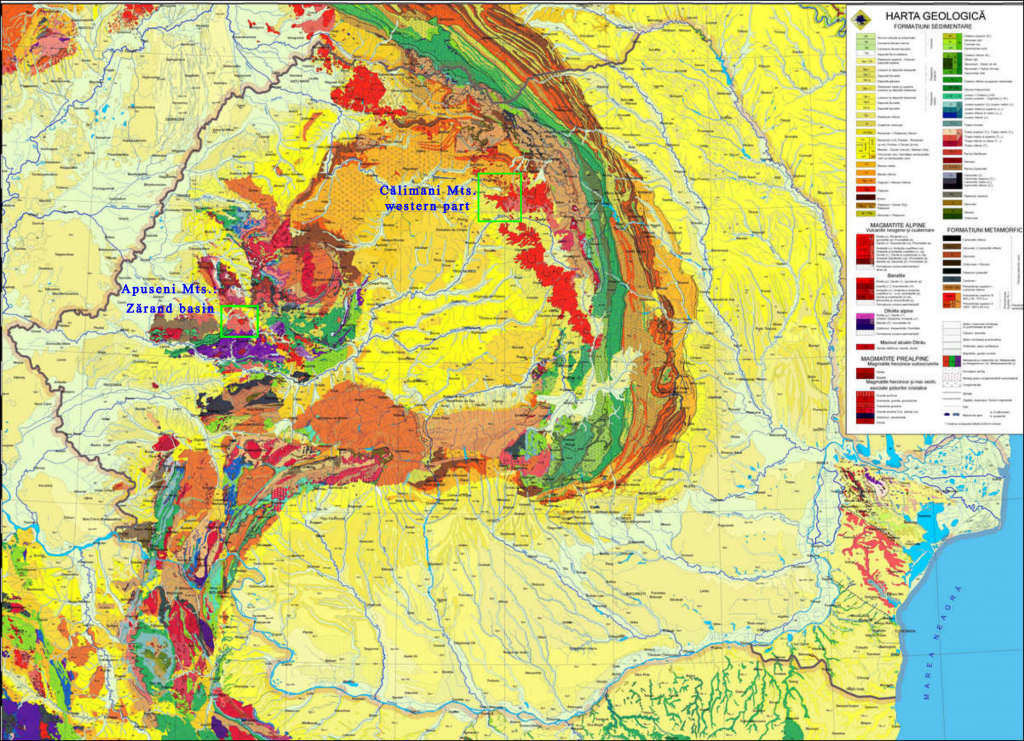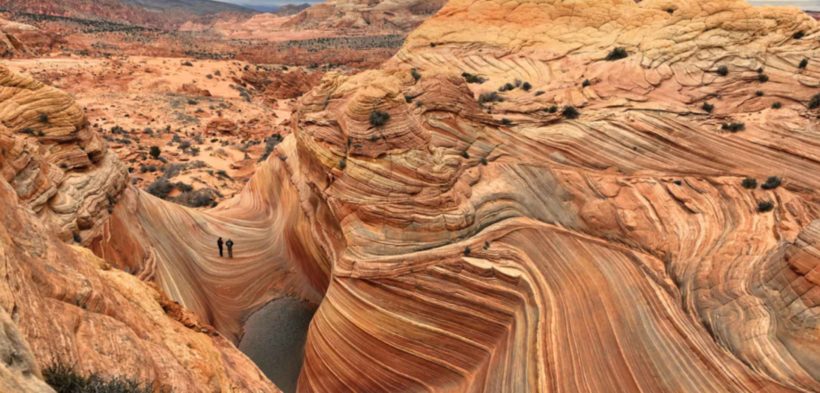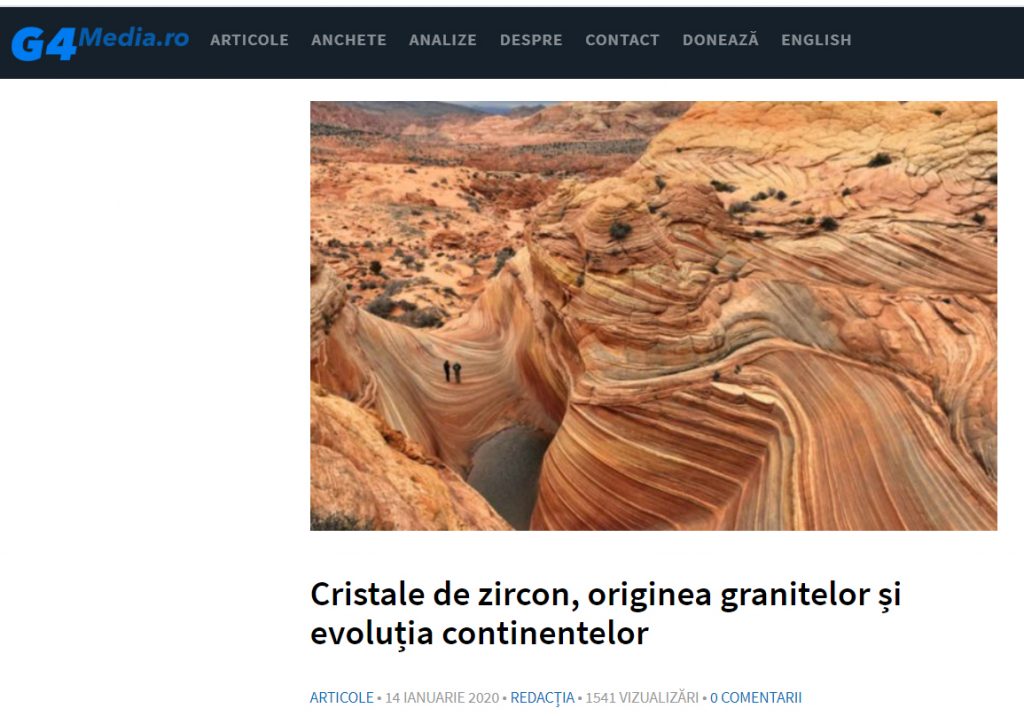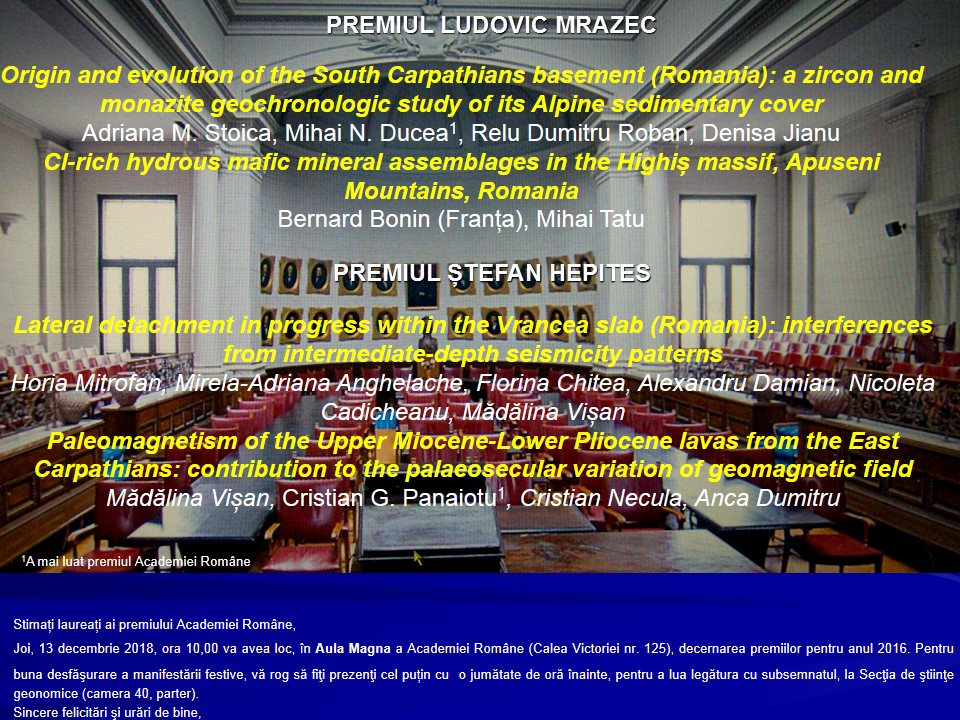
Final Report PCCF14 CUTE
CUTE Project “New Methods for Tracking Regional and Global Crustal Changes Using the Geochemical Record of Magmatic Rocks and Their Derivative Sediments” published the final report. You can read it on the Reports of results page or click to view
XXII International Congress of the CBGA, Plovdiv, Bulgaria, 7–11 September 2022
Participarea la XXII International Congress of the CBGA, Plovdiv, Bulgaria, 7–11 September 2022 în imagini:
A Brief History of Mining in Romania
Articol de popularizare : A Brief History of Mining in Romania.
A Brief History of Mining in Romania
Prezentare școli și licee
Popularizarea geologiei prin prezentări în școli și licee cu titlul: “Încurajam fetele sa devina geologii de mâine “.
Simpozion Aur și Oameni
SIMPOZIONUL NAŢIONAL de MEDIU ȚARA ABRUDULUI – AUR ȘI OAMENI
– Ediția a V-a – CIURULEASA, judeţul ALBA, 26 – 28 octombrie 2022
prezentarea : Aur si Oameni
ÎNCURAJĂM TINERELE ABSOLVENTE DE LICEU SĂ DEVINĂ GEOLOGII DE MÂINE
prezentare in cadru Săptămână Geologiei 2022 cu titlul:
“Încurajăm tinerele absolvente de liceu să devină geologii de mâine”
Bogăția de sub munte
Articol publicat în ziarul ziarul munților nr:9 2022.
Geologia este o știință complexă, captivantă, fără de care nu putem înțelege evoluția planetei noastre în decursul a aproape 4,5 miliarde de ani. Aceasta stă la baza furnizării resurselor de care omenirea depinde: minerale, roci, metale, apă, petrol și gaze etc. Această știință include o serie de domenii precum: mineralogia – studiul mineralelor; petrologia – studiul rocilor (magmatice, metamorfice și sedimentare); vulcanologia – studiul vulcanilor și al activității vulcanice; seismologia – studiul cutremurelor; paleontologia – studiul organismelor fosile animale și vegetale care au trăit în timp geologic; geologia structurală și tectonica – studiul structurilor și plăcilor tectonice; metalogenia – studiul proceselor care au dus la formarea zăcămintelor, etc.
Există și domenii aplicative cum sunt: geologia zăcămintelor de petrol și gaze naturale; geologia zăcămintelor de cărbuni; geologia zăcămintelor de substanțe minerale utile: metalifere și nemetalifere (Au, Ag, Cu, Pb, Zn, U, Fe, Mo, Hg, sare, etc.).
FEMEI ÎN GEOLOGIE
prezentare în cadru Săptămână Geologiei 2022:
FEMEI ÎN GEOLOGIE: CARIERE ȘI DĂRUIRE
2021 field trips drone pictures
The opportunity using the drone facilitated enhancing the geological observations that otherwise has been not possible to be achieved. The volcanic areas of Romania are heavily forested, but there are situations with large outcrops that are difficult or impossible to be examined. We are showing in the following some of this situation examined with the drone (with photo and movie) in two different volcanic areas with Miocene volcanism of Romania.
Apuseni Mts.: Zărand basin (see location on the map)
 This is a view taken from the western part of the Zărand basin, close to Gurahonţ town, showing in the foreground the two andesitic dome structures to the left and larger view of the andesitic Bontău volcano to the right. They have been generated along important fracture line during the basin generation.
This is a view taken from the western part of the Zărand basin, close to Gurahonţ town, showing in the foreground the two andesitic dome structures to the left and larger view of the andesitic Bontău volcano to the right. They have been generated along important fracture line during the basin generation.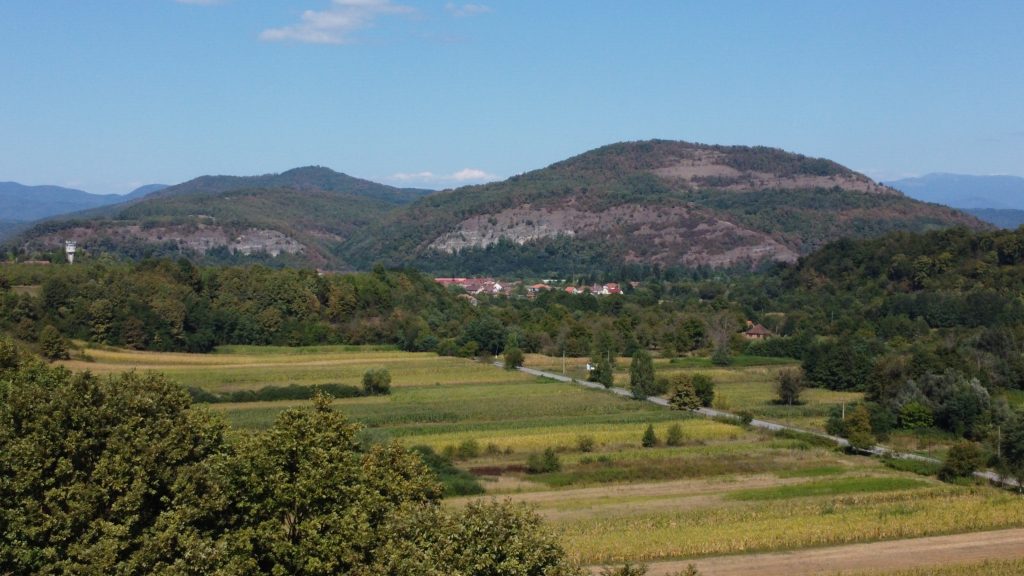 The image is showing closer the two dome structures given in [1]. It is observable that at their lower slopes there is a sequence of multiple layered deposits discernable by their whitish color. Such deposits represent the initiation of dome generation that is characterized by various explosive events some of them including pumice. The presence of pumice increases the whitish color of the deposits.
The image is showing closer the two dome structures given in [1]. It is observable that at their lower slopes there is a sequence of multiple layered deposits discernable by their whitish color. Such deposits represent the initiation of dome generation that is characterized by various explosive events some of them including pumice. The presence of pumice increases the whitish color of the deposits. Here there is a closer detail of the almost vertical cliff in layered pyroclastic deposits surrounding the dome. As mentioned before the whitish layers, sometimes discontinuous include pumice, proving the explosive characteristic at the dome initiation. The grayish layers are mostly angular clast-supported, suggesting their origin from dome destruction and fragmentation.
Here there is a closer detail of the almost vertical cliff in layered pyroclastic deposits surrounding the dome. As mentioned before the whitish layers, sometimes discontinuous include pumice, proving the explosive characteristic at the dome initiation. The grayish layers are mostly angular clast-supported, suggesting their origin from dome destruction and fragmentation.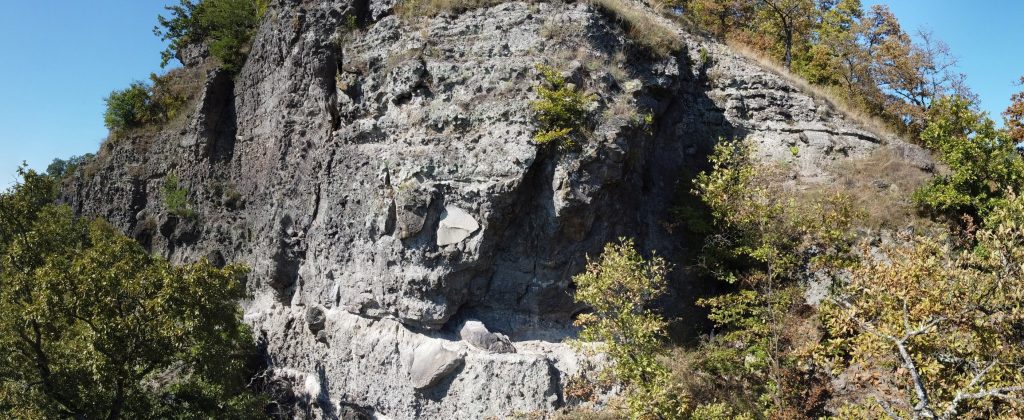 The view is even closer than previous and it is possible to better distinguish the layering sequence. Most of the deposits are decimeter to meter size and mostly are angular clast supported. There is a large size difference between the clasts in the same deposit.Călimani Mts., western part
The view is even closer than previous and it is possible to better distinguish the layering sequence. Most of the deposits are decimeter to meter size and mostly are angular clast supported. There is a large size difference between the clasts in the same deposit.Călimani Mts., western part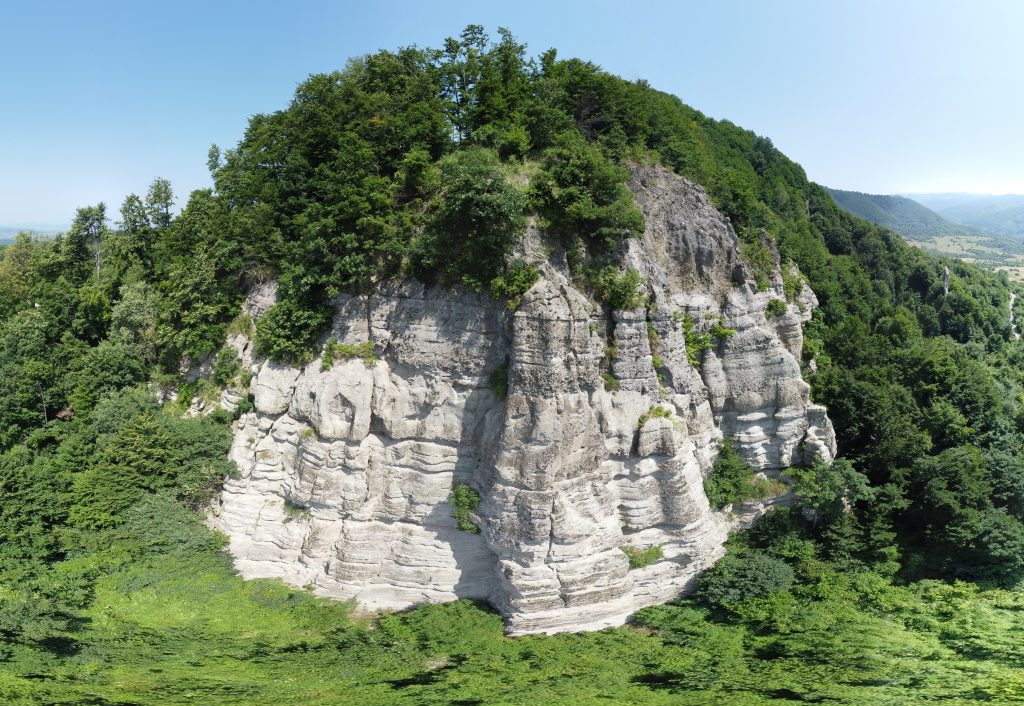 This is a ~50m vertical outcrop known as Piatra Corbului and included as geological reservation. The image is showing a layered sequence of andesitic deposits. At its base up to the one third the layers are thinner, mostly dm- to cm- sized characterized by fine ash material and pumice. Its texture is suggesting a secondary deposition most probably in a subaqueous environment. The upper third part is erosional and is looking as a sequence of thicker deposits, some of them angular clast supported. In the top right of the picture there is a breccia, most possible generated, as the deposits below from dome destruction and fragmentation, either as block and ash pyroclastic flows or breccias at the margins of a dome.
This is a ~50m vertical outcrop known as Piatra Corbului and included as geological reservation. The image is showing a layered sequence of andesitic deposits. At its base up to the one third the layers are thinner, mostly dm- to cm- sized characterized by fine ash material and pumice. Its texture is suggesting a secondary deposition most probably in a subaqueous environment. The upper third part is erosional and is looking as a sequence of thicker deposits, some of them angular clast supported. In the top right of the picture there is a breccia, most possible generated, as the deposits below from dome destruction and fragmentation, either as block and ash pyroclastic flows or breccias at the margins of a dome.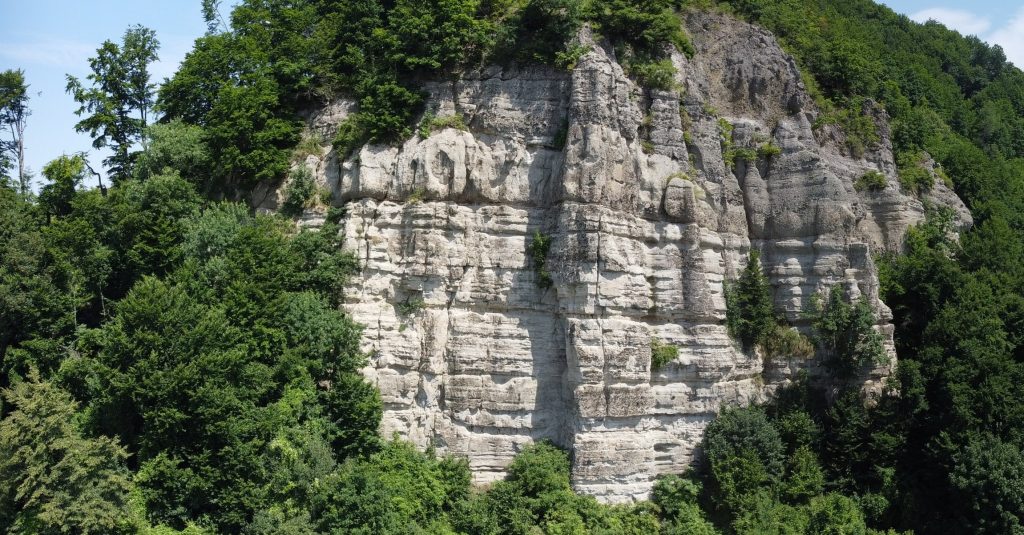 The picture is a closer view of the previous one [5]. Here it is easier to see the discordance between the lower thinner deposits and upper mostly angular clast-supported ones. Such situation is characteristic for the evolution and generation of dome systems in a volcanic environment.
The picture is a closer view of the previous one [5]. Here it is easier to see the discordance between the lower thinner deposits and upper mostly angular clast-supported ones. Such situation is characteristic for the evolution and generation of dome systems in a volcanic environment. This is a view of the northern ridge of the Cuşma town, western Călimani Mts. It is a sequence of finer and thinner (cam-dm size) and coarser and thicker (meter-size) fragmented deposits, showing a monogenetic composition. Most of them are primary as resulted from the dome destruction and fragmentation. Up to now such deposits were considered to be solely debris-flows (lahars).
This is a view of the northern ridge of the Cuşma town, western Călimani Mts. It is a sequence of finer and thinner (cam-dm size) and coarser and thicker (meter-size) fragmented deposits, showing a monogenetic composition. Most of them are primary as resulted from the dome destruction and fragmentation. Up to now such deposits were considered to be solely debris-flows (lahars).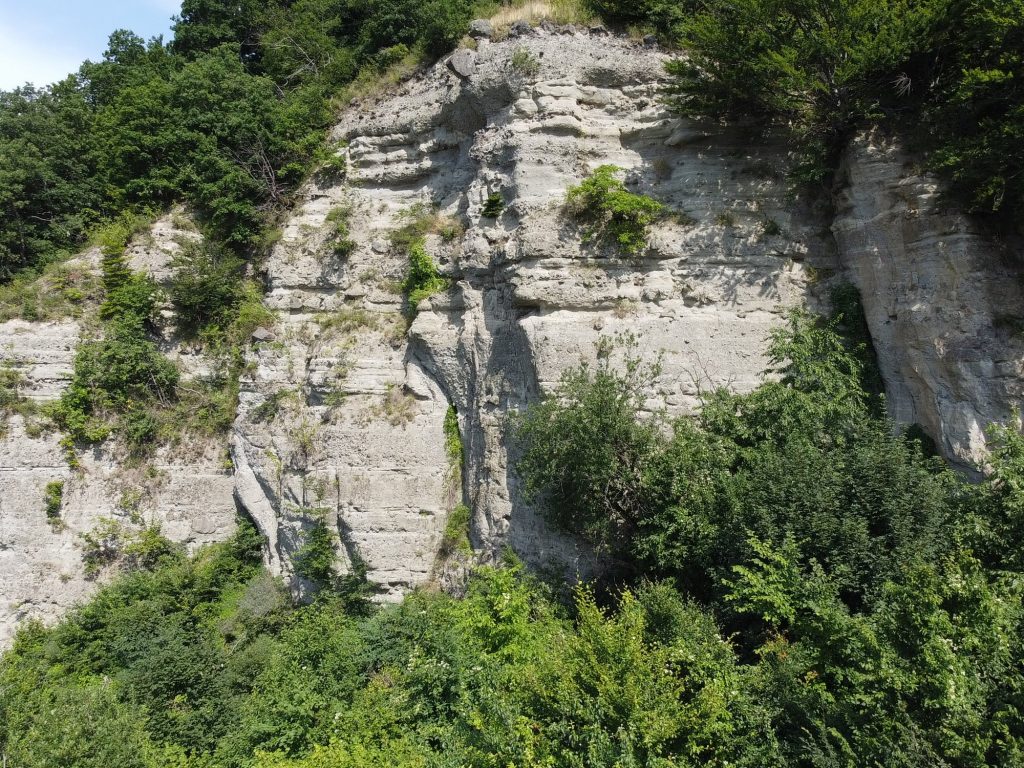 This is a closer view of [7]. Here it is obvious that the lower part is richer in fine and the upper part is richer in coarser layers where large angular clasts are more visible. The situation could be similar as in the pictures [5] and [6], but also the rock petrography is the same, represented by amphibole-pyroxene –bearing andesites.
This is a closer view of [7]. Here it is obvious that the lower part is richer in fine and the upper part is richer in coarser layers where large angular clasts are more visible. The situation could be similar as in the pictures [5] and [6], but also the rock petrography is the same, represented by amphibole-pyroxene –bearing andesites.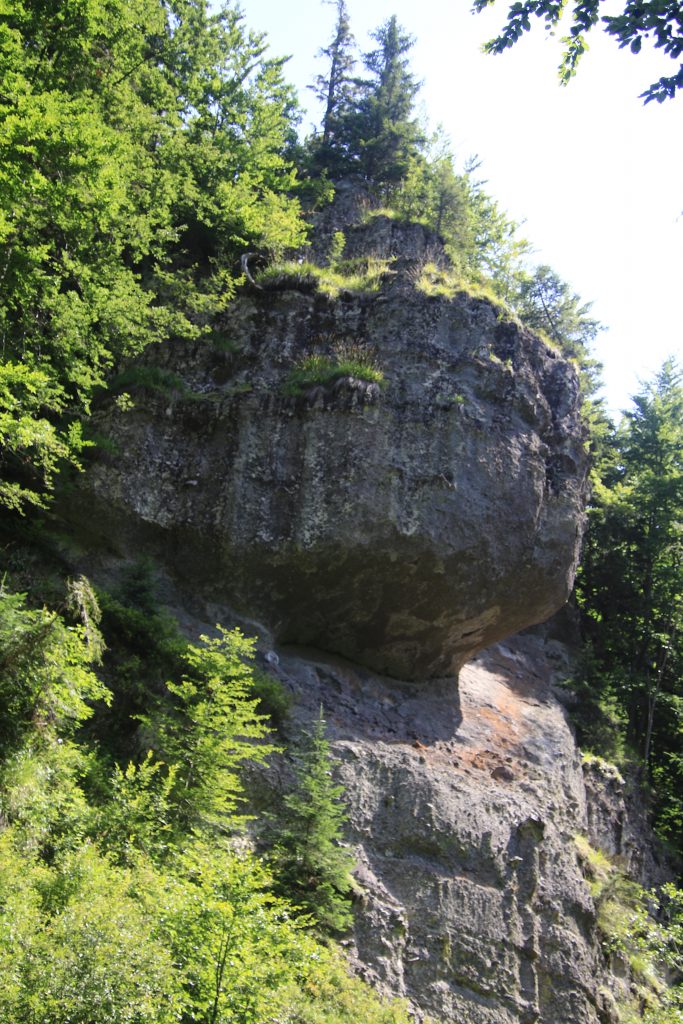 This view is from the Pietroasa valley (see map) and is characterized by a series of dm- to meter-size fragmented deposits. The deposits are matrix to clast –supported and monogenetic suggesting their origin in the dome destruction and fragmentation, either as block and ash deposits sometimes including pumices or dome breccias. The cliff hangover deposit in the upper part is showing an erosional concave base, suggesting an different, younger event.
This view is from the Pietroasa valley (see map) and is characterized by a series of dm- to meter-size fragmented deposits. The deposits are matrix to clast –supported and monogenetic suggesting their origin in the dome destruction and fragmentation, either as block and ash deposits sometimes including pumices or dome breccias. The cliff hangover deposit in the upper part is showing an erosional concave base, suggesting an different, younger event.
Time-laps of geologist work
A short video of how geologists are hammering a igneous rock, mark position with GPS and bag-it the sample. Enjoy.
2021 articles published in BDI journals by CUTE
Stoica A., and Ducea, M.N., 2021, A Mineral Scale Geochemical Investigation of Ultramafic Rocks From the San Carlos and Kilbourne Hole Xenolith Localities, Southwestern U.S.A.; Insights Into the Origin of the Regional Shallow Mantle: Open Science Framework DOI10.17605/OSF.IO/RKV38, Revue Rom de Geol, in press. Click to View
Ducea, M.N., 2021, On the Late Permian Age (258.3 +/- 2.5 Ma) and Tectonic Significance of the Cataracte Pegmatitic Leucogranite (Valcea County, Romania): Open Science Framework DOI10.17605/OSF.IO/2GRP6, Revue Rom de Geol, in press. Click to View
Sundell, K., Laskowski, A., Kapp, P., Ducea, M.N., Chapman, J., 2021, Jurassic to Neogene Quantitative Crustal Thickness Estimates in Southern Tibet, GSA Today, v. 31, p. 4-10, 10.1130/GSATG461A.1 Click to View
Iatan Elena-Luisa 2021. Optical mineralogy and magnetic properties of four chondritic meteorites from Algerian West Sahara Desert. Rom. J. Mineral Deposits,vol. 94 (2021), No. 1-2, ISSN 1220-5648, in press
Pintea, Ioan; Berbeleac, Ion, Udubașa, Sorin Silviu; Nuţu-Dragomir, Maria-Lidia; Iatan , Luisa Elena 2021. Fluid and melt inclusions study related to the magmatic-hydrothermal apatite-anhydrite association from Voia porphyry Cu-Au-(Mo) prospect (Metaliferi Mountains, Romania). Revue Rom de Geol, Publishing House of the Romanian Academy, p15, in press
Latest 2021 ISI published articles of CUTE project
Chapman, J. B., Shields, J. E., Ducea, M. N., Paterson, S. R., Attia, S., and Ardill, K. E., 2021, The causes of continental arc flare ups and drivers of episodic magmatic activity in Cordilleran orogenic systems: Lithos, v. 398. Article number 106307. Click to View
Ducea, M. N., Chapman, A. D., Bowman, E., and Balica, C., 2021, Arclogites and their role in continental evolution; part 2: Relationship to batholiths and volcanoes, density and foundering, remelting and long-term storage in the mantle: Earth-Science Reviews, v. 214, article number 103476. Click to View
Ducea, M. N., Chapman, A. D., Bowman, E., and Triantafyllou, A., 2021, Arclogites and their role in continental evolution; part 1: Background, locations, petrography, geochemistry, chronology and thermobarometry: Earth-Science Reviews, v. 214, article number 103375. Click to View
Fernicola, J. C., Zimicz, A. N., Chornogubsky, L., Ducea, M., Cruz, L. E., Bond, M., Arnal, M., Cardenas, M., and Fernandez, M., 2021, The Early Eocene Climatic Optimum at the Lower Section of the Lumbrera Formation (Ypresian, Salta Province, Northwestern Argentina): Origin and Early Diversification of the Cingulata: Journal of Mammalian Evolution, v. 28, no. 3, p. 621-633. Click to View
Jepson, G., Carrapa, B., George, S. W. M., Triantafyllou, A., Egan, S. M., Constenius, K. N., Gehrels, G. E., and Ducea, M. N., 2021, Resolving mid- to upper-crustal exhumation through apatite petrochronology and thermochronology: Chemical Geology, v. 565, article number 120071. Click to View
Stephens, J. A., Ducea, M. N., Killick, D. J., and Ruiz, J., 2021, Use of non-traditional heavy stable isotopes in archaeological research: Journal of Archaeological Science, v. 127, article number 105334. Click to View
Vlasceanu, M., Ducea, M. N., Luffi, P., Barla, A., and Seghedi, I., 2021, Carpathian-Pannonian Magmatism Database: Geochemistry Geophysics Geosystems, v. 22, no. 9, Article e2021GC009970. Click to View
Zeng, Y., Ducea, M. N., Xu, J., Chen, J., and Dong, Y.-H., 2021, Negligible surface uplift following foundering of thickened central Tibetan lower crust: Geology, v. 49, no. 1, p. 45-50. Click to View
Seghedi, I., Ntaflos,T., Pécskay, Z., Panaiotu, C., Mirea V., Downes H., 2021. Miocene extension and magma generation in the Apuseni Mts. (western Romania): a review. International Geology Review, DOI: 10.1080/00206814.2021.1962416. Click to View
Scoggin, S.H., Chapman, J.B., Shields, J.E., Trzinski, A.E. ,Ducea, M. N., – Early-Paleogene magmatism in the Pinaleño Mountains, Arizona: evidence for crustal melting of diverse basement assemblages during the Laramide Orogeny. Journal of Petrology, egab095, https://doi.org/10.1093/petrology/egab095, 2021 Click to View
Bowman, E.E., Ducea, M.N., Triantafyllou, A, 2021, Arclogites in the subarc lower crust: effects of crystallization, partial melting, and retained melt on the foundering ability of residual roots, Journal of Petrology, in press, 10.1093/petrology/egab094 Click to View
Zhang, L., Fan, W., Ding, L., Pullen, A., Ducea, M.N., Li, J., Wang, C., Xu, X., Sein, K., 2021, Forced subduction initiation within the Neotethys: An example from the mid-Cretaceous Wuntho-Popa arc in Myanmar, Geological Society of America Bulletin, in press, 10.1130/B35818.1 Click to View
Marcus J. Origlieri M J, Downs R T, Hoffman D R, Ducea M Nand Post J E., 2021, Marshallsussmanite, NaCaMnSi3O8(OH), a new pectolite-group mineral providing insight into hydrogen bonding in pyroxenoids. Mineralogical Magazine (2021), 85, 444–453, doi:10.1180/mgm.2018.2 Click to View
2021 participation of CUTE project members to conferences
Abstracts from EGU General Assembly 2021:
Mihai Tatu, Elena Luisa Iatan (2021). Late Cretaceous short-lived magmatism andrelated metallogenesis in the Carpathian area (Romania): connections with Balkans. EGU General Assembly 2021, 19–30 April, Vienna, Austria. Abstract EGU21-6452
Elena-Luisa Iatan (2021). The occurrence of gold in Voia deposit, South Apuseni Mountains, Romania. EGU General Assembly 2021, 19–30 April, Vienna, Austria. Abstract EGU21-4813
Viorel Mirea, Alexandru Szakacs, Ioan Seghedi (2021) An investigation approach of the volcanic geomorphology in the Călimani – Gurghiu – Harghita volcanic chain, Romania. EGU21-10745. https://doi.org/10.5194/egusphere-egu21-10745. Abstract EGU21-10745
G.C. Stefan, V.Mirea, I. Seghedi (2021) The Bontău Volcano, Apuseni Mts. (Romania), source for numerous debris avalanche deposits. EGU21-10855, https://doi.org/10.5194/egusphere-egu21-10855. Abstract egu21-10855
In Press
Cristale de zircon, originea granitelor și evoluția continentelor
Field Trips GSA219
Plan now to take advantage of these unique trips as part of your GSA 2019 experience.
https://community.geosociety.org/gsa2019/learn/field
Cosponsors: GSA Geochronology Division; GSA Mineralogy, Geochemistry, Petrology, and Volcanology Division; GSA Structural Geology and Tectonics Division.
Leaders: Alan D. Chapman, Macalester College; Nancy Riggs; Mihai N. Ducea.
Trip Description
This one-day outing will showcase Late Oligocene to Quaternary volcanic rocks and entrained lower-crustal and mantle xenoliths of the Transition Zone between the Colorado Plateau and the Basin and Range, as these materials provide key constraints on the tectonic evolution of the region. Important themes to be examined include (1) the growth, tectonic displacement, and foundering of sub-orogenic plateau (i.e., Nevadaplano) root material; and (2) the interplay between deep crust/upper mantle processes, late Cenozoic magmatism, and metamorphic core complex development.
Primary Leader Email Address: chapman@macalester.edu
Key qualifications: I’ve been engaged in NSF-funded study of the xenolith localities to be visited since 2015. I have been leading professional (e.g., a GSA Cordilleran Section Meeting trip in 2016), teaching, and outreach field trips for over a decade. Phoenix, Arizona, is an ideal central location from which to run this trip. All locations to be visited are within 1.5 hours’ drive from Phoenix. Professional preparation and appointments: University of Minnesota, B.S., 2005; California Institute of Technology; Ph.D., 2011, University of Arizona; Postdoctoral Researcher 2011–2013 Stanford University; Postdoctoral Researcher 2013–2014 Missouri S&T; Asst. Prof. of Geology 2013–2015 Macalester College; Asst. Prof. of Geology 2015. Relevant experience: Completed two three-week field camps through the University of Minnesota (2004 and 2005); completed two months of Ph.D. geologic mapping in a mountainous region of southern California (2006–2010); taught several one-day classes on the local geology at the Wind Wolves Preserve, California (summer, 2008–fall, 2009); teaching assistant for four-day field mapping projects at Caltech (2007, 2008, 2009, and 2010), led four one-day field trips for Don Benito Elementary School students and teachers, grades 2–6, on the geology of Eaton Canyon in Altadena, California (summer, 2008–winter, 2010); teaching assistant for three-week field camp through University of Arizona (2012); taught Missouri University of Science & Technology three-week summer field camp (2013 and 2014); led a two-day field institute to the Salinian block (central coastal California) for the GeoPrisms ExTerra Group in fall, 2014; led a two-day GSA Cordilleran section field trip to the southern Sierra Nevada–Mojave Desert (2016); led “Camp Rocks,” a three-day 4H camp in the Black Hills of Yavapai County for 52 4th–7th grade attendees from Yuma, Pima, and Maricopa counties, Arizona (2017); led a one-day geology activity and a hike for 30 students from Capitol Hill elementary school, St. Paul, Minnesota (May 2018).
ABSTRACTS:
Ducea Mihai N. DRIP TECTONICS UNDER MAGMATIC ARCS. Click to View
Ducea Mihai N. ZIRCON PETROCHRONOLOGY: GRANITOID MELTING CONDITIONS AND CONTINENTAL EVOLUTION. Click to View
Triantafyllou Antoine, Hodel Florent, Berger Julien, Macouin Melina, Baele Jean-Marc, Mattielli Nadine, Monnier Christophe, Ducea Mihai N., Poujol Marc, Langlade Jessica and Trindade Ricardo I.F. THE BOU AZZER AND SIRWA OPHIOLITES (ANTI-ATLAS, MOROCCO): INSIGHT INTO POLYPHASED SUBDUCTION-ACCRETION DYNAMICS DURING NEOPROTEROZOIC TIMES. Click to View
Ryan Eden, Kurt Sundell, Barbara Carrapa, Mihai Ducea, Joel Saylor. ZIRCON U-PB–LU-HF PETROCHRONOLOGY OF THE LATE CENOZOIC CENTRAL ANDES OF SOUTHERN PERU. Click to View
Chapman Alan D., Rautela Ojashvi, Shields Jessie E., Ducea Mihai N. and Saleeby Jason B. FATE OF THE LOWER LITHOSPHERE DURING SHALLOW-ANGLE SUBDUCTION: THE LARAMIDE EXAMPLE. Click to View
Promoting geosciences in high school
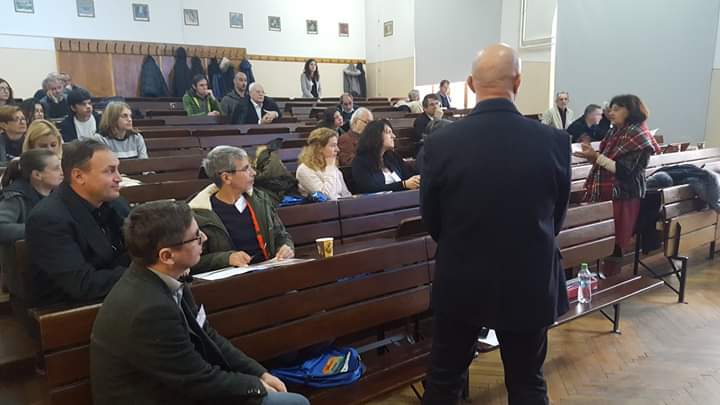
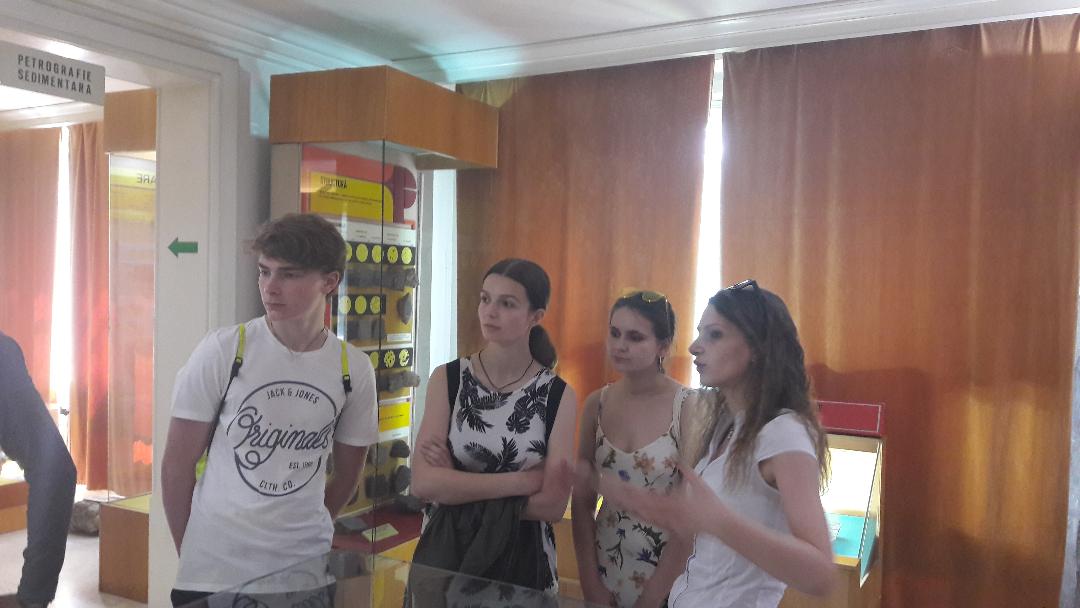
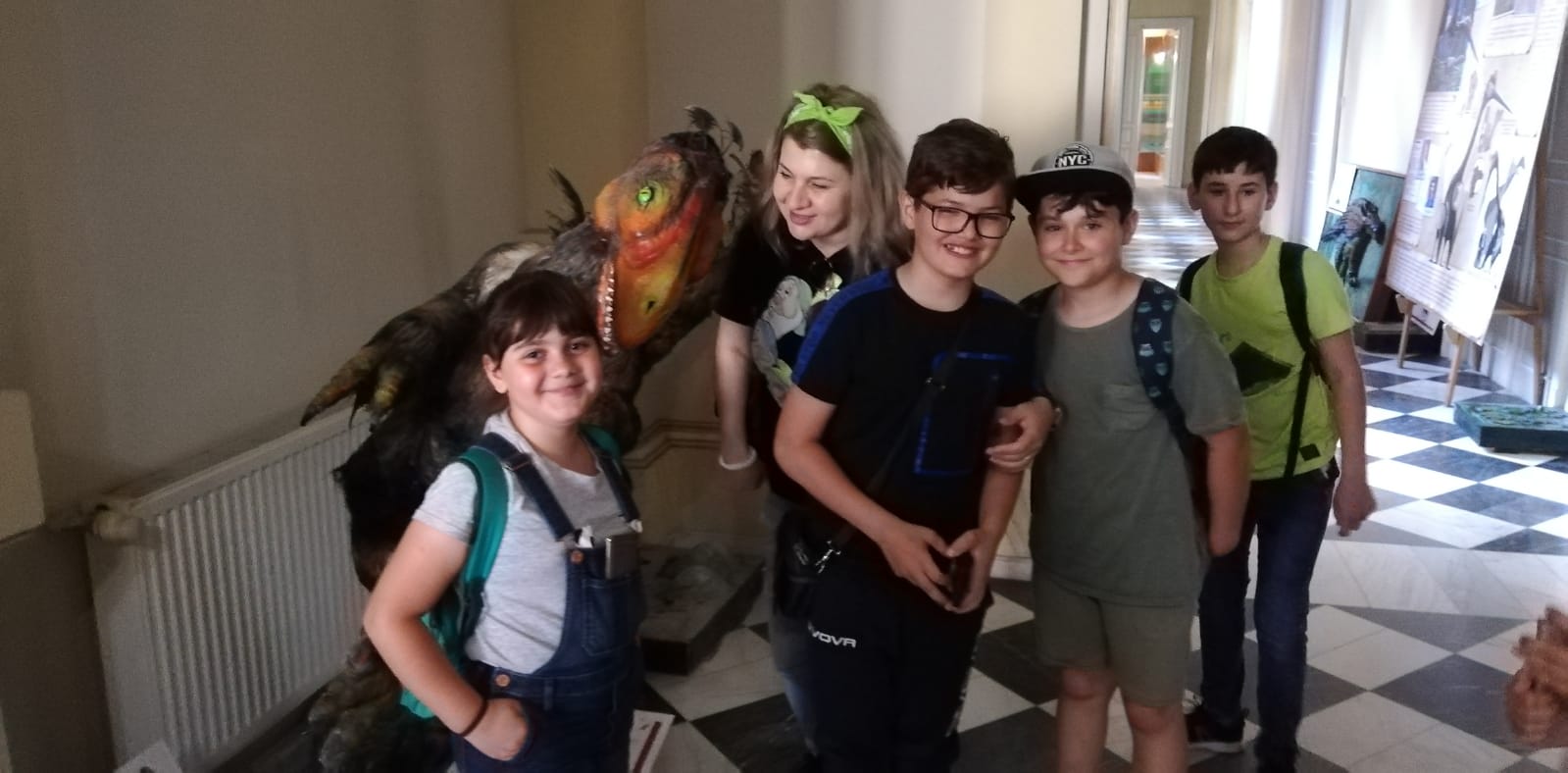

Romanian Academy Awards in 2018
6 members of the CUTE project receive the Romanian Academy Awards in 2018 for 4 separate papers!
Previously published papers
Scott, E. M., Allen, M. B., MacPherson, C. G., McCaffrey, K. J. W., Davidson, J. P., Saville, C., & Ducea, M. N. (2018). Andean surface uplift constrained by radiogenic isotopes of arc lavas. Nature Communications, 9(1), [969]. https://doi.org/10.1038/s41467-018-03173-4. Click to View
Mihai N. Ducea, George W. Bergantz, James L. Crowley and Juan Otamendi (2017). Ultrafast magmatic buildup and diversification to produce continental crust during subduction. DOI:http://dx.doi.org/10.1130/G38726.1. Click to View
Hu, F., Ducea, M. N., Liu, S., & Chapman, J. B. (2017). Quantifying Crustal Thickness in Continental Collisional Belts: Global Perspective and a Geologic Application. Scientific Reports, 7(1), [7058]. https://doi.org/10.1038/s41598-017-07849-7. Click to View
James B. Chapman, George E. Gehrels, Mihai N. Ducea, Nicky Giesler, Alex Pullen. (2016). A new method for estimating parent rock trace element concentrations from zircon. Chemical Geology, ISSN: 0009-2541, Vol: 439, Page: 59-70. Click to View
Paterson, S. R., & Ducea, M. N. (2015). Arc magmatic tempos: Gathering the evidence. Elements, 11(2), 91-98. https://doi.org/10.2113/gselements.11.2.91. Click to View
Mihai N. Ducea; Scott R. Paterson; Peter G. DeCelles (2015). High-Volume Magmatic Events in Subduction Systems. Elements 11(2):99-104 DOI: 10.2113/gselements.11.2.99. Click to View
Mihai N. Ducea, Jason B. Saleeby and George Bergantz (2015). The Architecture, Chemistry, and Evolution of Continental Magmatic Arcs. Annual Review of Earth and Planetary Sciences 43(1). DOI: 10.1146/annurev-earth-060614-105049. Click to View
James B. Chapman Mihai N. Ducea Peter G. DeCelles Lucia Profeta. (2015) Tracking changes in crustal thickness during orogenic evolution with Sr/Y: An example from the North American Cordillera. Geology 43 (10): 919-922.https://doi.org/10.1130/G36996.1. Click to View
Lucia Profeta, Mihai N. Ducea, James B. Chapman, Scott R. Paterson, Susana Marisol Henriquez Gonzales, Moritz Kirsch, Lucian Petrescu & Peter G. DeCelles. (2015). Quantifying crustal thickness over time in magmatic arcs. Scientific Reports. DOI: 10.1038/srep17786. Click to View
